mirror of
https://github.com/isar/libmdbx.git
synced 2024-10-30 23:39:19 +08:00
592 lines
26 KiB
Markdown
592 lines
26 KiB
Markdown
### The [repository now only mirrored on the Github](https://abf.io/erthink/libmdbx) due to illegal discriminatory restrictions for Russian Crimea and for sovereign crimeans.
|
|
<!-- Required extensions: pymdownx.betterem, pymdownx.tilde, pymdownx.emoji, pymdownx.tasklist, pymdownx.superfences -->
|
|
-----
|
|
|
|
libmdbx
|
|
======================================
|
|
|
|
_libmdbx_ is an extremely fast, compact, powerful, embedded
|
|
transactional [key-value
|
|
store](https://en.wikipedia.org/wiki/Key-value_database)
|
|
database, with permissive [OpenLDAP Public License](LICENSE).
|
|
_libmdbx_ has a specific set of properties and capabilities,
|
|
focused on creating unique lightweight solutions with
|
|
extraordinary performance.
|
|
|
|
The next version is under active non-public development and will be
|
|
released as **_MithrilDB_** and `libmithrildb` for libraries & packages.
|
|
Admittedly mythical [Mithril](https://en.wikipedia.org/wiki/Mithril) is
|
|
resembling silver but being stronger and lighter than steel. Therefore
|
|
_MithrilDB_ is rightly relevant name.
|
|
> _MithrilDB_ will be radically different from _libmdbx_ by the new
|
|
> database format and API based on C++17, as well as the [Apache 2.0
|
|
> License](https://www.apache.org/licenses/LICENSE-2.0). The goal of this
|
|
> revolution is to provide a clearer and robust API, add more features and
|
|
> new valuable properties of database.
|
|
|
|
*The Future will (be) [Positive](https://www.ptsecurity.com). Всё будет хорошо.*
|
|
|
|
[](https://travis-ci.org/leo-yuriev/libmdbx)
|
|
[](https://ci.appveyor.com/project/leo-yuriev/libmdbx/branch/master)
|
|
[](https://scan.coverity.com/projects/reopen-libmdbx)
|
|
|
|
## Table of Contents
|
|
- [Overview](#overview)
|
|
- [Comparison with other databases](#comparison-with-other-databases)
|
|
- [History & Acknowledgments](#history)
|
|
- [Description](#description)
|
|
- [Key features](#key-features)
|
|
- [Improvements over LMDB](#improvements-over-lmdb)
|
|
- [Gotchas](#gotchas)
|
|
- [Usage](#usage)
|
|
- [Building](#building)
|
|
- [Bindings](#bindings)
|
|
- [Performance comparison](#performance-comparison)
|
|
- [Integral performance](#integral-performance)
|
|
- [Read scalability](#read-scalability)
|
|
- [Sync-write mode](#sync-write-mode)
|
|
- [Lazy-write mode](#lazy-write-mode)
|
|
- [Async-write mode](#async-write-mode)
|
|
- [Cost comparison](#cost-comparison)
|
|
|
|
-----
|
|
|
|
## Overview
|
|
|
|
_libmdbx_ is revised and extended descendant of amazing [Lightning
|
|
Memory-Mapped
|
|
Database](https://en.wikipedia.org/wiki/Lightning_Memory-Mapped_Database).
|
|
_libmdbx_ inherits all features and characteristics from
|
|
[LMDB](https://en.wikipedia.org/wiki/Lightning_Memory-Mapped_Database),
|
|
but resolves some issues and adds several features.
|
|
|
|
- _libmdbx_ guarantee data integrity after crash unless this was explicitly
|
|
neglected in favour of write performance.
|
|
|
|
- _libmdbx_ allows multiple processes to read and update several key-value
|
|
tables concurrently, while being
|
|
[ACID](https://en.wikipedia.org/wiki/ACID)-compliant, with minimal
|
|
overhead and Olog(N) operation cost.
|
|
|
|
- _libmdbx_ enforce
|
|
[serializability](https://en.wikipedia.org/wiki/Serializability) for
|
|
writers by single
|
|
[mutex](https://en.wikipedia.org/wiki/Mutual_exclusion) and affords
|
|
[wait-free](https://en.wikipedia.org/wiki/Non-blocking_algorithm#Wait-freedom)
|
|
for parallel readers without atomic/interlocked operations, while
|
|
writing and reading transactions do not block each other.
|
|
|
|
- _libmdbx_ uses [B+Trees](https://en.wikipedia.org/wiki/B%2B_tree) and
|
|
[Memory-Mapping](https://en.wikipedia.org/wiki/Memory-mapped_file),
|
|
doesn't use [WAL](https://en.wikipedia.org/wiki/Write-ahead_logging)
|
|
which might be a caveat for some workloads.
|
|
|
|
- _libmdbx_ implements a simplified variant of the [Berkeley
|
|
DB](https://en.wikipedia.org/wiki/Berkeley_DB) and/or
|
|
[dbm](https://en.wikipedia.org/wiki/DBM_(computing)) API.
|
|
|
|
- _libmdbx_ supports Linux, Windows, MacOS, FreeBSD and other systems
|
|
compliant with POSIX.1-2008.
|
|
|
|
### Comparison with other databases
|
|
For now please refer to [chapter of "BoltDB comparison with other
|
|
databases"](https://github.com/coreos/bbolt#comparison-with-other-databases)
|
|
which is also (mostly) applicable to _libmdbx_.
|
|
|
|
### History
|
|
At first the development was carried out within the
|
|
[ReOpenLDAP](https://github.com/leo-yuriev/ReOpenLDAP) project. About a
|
|
year later _libmdbx_ was separated into standalone project, which was
|
|
[presented at Highload++ 2015
|
|
conference](http://www.highload.ru/2015/abstracts/1831.html).
|
|
|
|
Since 2017 _libmdbx_ is used in [Fast Positive Tables](https://github.com/leo-yuriev/libfpta),
|
|
and development is funded by [Positive Technologies](https://www.ptsecurity.com).
|
|
|
|
### Acknowledgments
|
|
Howard Chu <hyc@openldap.org> is the author of LMDB, from which
|
|
originated the MDBX in 2015.
|
|
|
|
Martin Hedenfalk <martin@bzero.se> is the author of `btree.c` code, which
|
|
was used for begin development of LMDB.
|
|
|
|
-----
|
|
|
|
Description
|
|
===========
|
|
|
|
## Key features
|
|
|
|
1. Key-value pairs are stored in ordered map(s), keys are always sorted,
|
|
range lookups are supported.
|
|
|
|
2. Data is [memory-mapped](https://en.wikipedia.org/wiki/Memory-mapped_file)
|
|
into each worker DB process, and could be accessed zero-copy from transactions.
|
|
|
|
3. Transactions are
|
|
[ACID](https://en.wikipedia.org/wiki/ACID)-compliant, through to
|
|
[MVCC](https://en.wikipedia.org/wiki/Multiversion_concurrency_control)
|
|
and [CoW](https://en.wikipedia.org/wiki/Copy-on-write). Writes are
|
|
strongly serialized and aren't blocked by reads, transactions can't
|
|
conflict with each other. Reads are guaranteed to get only commited data
|
|
([relaxing serializability](https://en.wikipedia.org/wiki/Serializability#Relaxing_serializability)).
|
|
|
|
4. Read transactions are
|
|
[non-blocking](https://en.wikipedia.org/wiki/Non-blocking_algorithm),
|
|
don't use [atomic operations](https://en.wikipedia.org/wiki/Linearizability#High-level_atomic_operations).
|
|
Readers don't block each other and aren't blocked by writers. Read
|
|
performance scales linearly with CPU core count.
|
|
> Nonetheless, "connect to DB" (starting the first read transaction in a thread) and
|
|
> "disconnect from DB" (closing DB or thread termination) requires a lock
|
|
> acquisition to register/unregister at the "readers table".
|
|
|
|
5. Keys with multiple values are stored efficiently without key
|
|
duplication, sorted by value, including integers (valuable for
|
|
secondary indexes).
|
|
|
|
6. Efficient operation on short fixed length keys,
|
|
including 32/64-bit integer types.
|
|
|
|
7. [WAF](https://en.wikipedia.org/wiki/Write_amplification) (Write
|
|
Amplification Factor) и RAF (Read Amplification Factor) are Olog(N).
|
|
|
|
8. No [WAL](https://en.wikipedia.org/wiki/Write-ahead_logging) and
|
|
transaction journal. In case of a crash no recovery needed. No need for
|
|
regular maintenance. Backups can be made on the fly on working DB
|
|
without freezing writers.
|
|
|
|
9. No additional memory management, all done by basic OS services.
|
|
|
|
|
|
## Improvements over LMDB
|
|
|
|
_libmdbx_ is superior to _legendary [LMDB](https://symas.com/lmdb/)_ in
|
|
terms of features and reliability, not inferior in performance. In
|
|
comparison to LMDB, _libmdbx_ make things "just work" perfectly and
|
|
out-of-the-box, not silently and catastrophically break down. The list
|
|
below is pruned down to the improvements most notable and obvious from
|
|
the user's point of view.
|
|
|
|
1. Automatic on-the-fly database size control by preset parameters, both
|
|
reduction and increment.
|
|
> _libmdbx_ manage the database size according to parameters specified
|
|
> by `mdbx_env_set_geometry()` function,
|
|
> ones include the growth step and the truncation threshold.
|
|
|
|
2. Automatic continuous zero-overhead database compactification.
|
|
> _libmdbx_ logically move as possible a freed pages
|
|
> at end of allocation area into unallocated space,
|
|
> and then release such space if a lot of.
|
|
|
|
3. LIFO policy for recycling a Garbage Collection items. On systems with a disk
|
|
write-back cache, this can significantly increase write performance, up to
|
|
several times in a best case scenario.
|
|
> LIFO means that for reuse pages will be taken which became unused the lastest.
|
|
> Therefore the loop of database pages circulation becomes as short as possible.
|
|
> In other words, the number of pages, that are overwritten in memory
|
|
> and on disk during a series of write transactions, will be as small as possible.
|
|
> Thus creates ideal conditions for the efficient operation of the disk write-back cache.
|
|
|
|
4. Fast estimation of range query result volume, i.e. how many items can
|
|
be found between a `KEY1` and a `KEY2`. This is prerequisite for build
|
|
and/or optimize query execution plans.
|
|
> _libmdbx_ performs a rough estimate based only on b-tree pages that
|
|
> are common for the both stacks of cursors that were set to corresponing
|
|
> keys.
|
|
|
|
5. `mdbx_chk` tool for database integrity check.
|
|
|
|
6. Guarantee of database integrity even in asynchronous unordered write-to-disk mode.
|
|
> _libmdbx_ propose additional trade-off by implementing append-like manner for updates
|
|
> in `NOSYNC` and `MAPASYNC` modes, that avoid database corruption after a system crash
|
|
> contrary to LMDB. Nevertheless, the `MDBX_UTTERLY_NOSYNC` mode available to match LMDB behaviour,
|
|
> and for a special use-cases.
|
|
|
|
7. Automated steady flush to disk upon volume of changes and/or by
|
|
timeout via cheap polling.
|
|
|
|
8. Sequence generation and three cheap persistent 64-bit markers with ACID.
|
|
|
|
9. Support for keys and values of zero length, including multi-values
|
|
(aka sorted duplicates).
|
|
|
|
10. The handler of lack-of-space condition with a callback,
|
|
that allow you to control and resolve such situations.
|
|
|
|
11. Support for opening a database in the exclusive mode, including on a network share.
|
|
|
|
12. Extended transaction info, including dirty and leftover space info
|
|
for a write transaction, reading lag and hold over space for read
|
|
transactions.
|
|
|
|
13. Extended whole-database info (aka environment) and reader enumeration.
|
|
|
|
14. Extended update or delete, _at once_ with getting previous value
|
|
and addressing the particular item from multi-value with the same key.
|
|
|
|
15. Support for explicitly updating the existing record, not insertion a new one.
|
|
|
|
16. All cursors are uniformly, can be reused and should be closed explicitly,
|
|
regardless ones were opened within write or read transaction.
|
|
|
|
17. Correct update of current record with `MDBX_CURRENT` flag when size
|
|
of key or data was changed, including sorted duplicated.
|
|
|
|
18. Opening database handles is spared from race conditions and
|
|
pre-opening is not needed.
|
|
|
|
19. Ability to determine whether the particular data is on a dirty page
|
|
or not, that allows to avoid copy-out before updates.
|
|
|
|
20. Ability to determine whether the cursor is pointed to a key-value
|
|
pair, to the first, to the last, or not set to anything.
|
|
|
|
21. Returning `MDBX_EMULTIVAL` error in case of ambiguous update or delete.
|
|
|
|
22. On **MacOS** the `fcntl(F_FULLFSYNC)` syscall is used _by
|
|
default_ to synchronize data with the disk, as this is [the only way to
|
|
guarantee data
|
|
durability](https://developer.apple.com/library/archive/documentation/System/Conceptual/ManPages_iPhoneOS/man2/fsync.2.html)
|
|
in case of power failure. Unfortunately, in scenarios with high write
|
|
intensity, the use of `F_FULLFSYNC` significant degrades performance
|
|
compared to LMDB, where the `fsync()` syscall is used. Therefore,
|
|
_libmdbx_ allows you to override this behavior by defining the
|
|
`MDBX_OSX_SPEED_INSTEADOF_DURABILITY=1` option while build the library.
|
|
|
|
23. On **Windows** the `LockFileEx()` syscall is used for locking, since
|
|
it allows place the database on network drives, and provides protection
|
|
against incompetent user actions (aka
|
|
[poka-yoke](https://en.wikipedia.org/wiki/Poka-yoke)). Therefore
|
|
_libmdbx_ may be a little lag in performance tests from LMDB where a
|
|
named mutexes are used.
|
|
|
|
|
|
## Gotchas
|
|
|
|
1. There cannot be more than one writer at a time.
|
|
> On the other hand, this allows serialize an updates and eliminate any
|
|
> possibility of conflicts, deadlocks or logical errors.
|
|
|
|
2. No [WAL](https://en.wikipedia.org/wiki/Write-ahead_logging) means
|
|
relatively big [WAF](https://en.wikipedia.org/wiki/Write_amplification)
|
|
(Write Amplification Factor). Because of this syncing data to disk might
|
|
be quite resource intensive and be main performance bottleneck during
|
|
intensive write workload.
|
|
> As compromise _libmdbx_ allows several modes of lazy and/or periodic
|
|
> syncing, including `MAPASYNC` mode, which modificate data in memory and
|
|
> asynchronously syncs data to disk, moment to sync is picked by OS.
|
|
>
|
|
> Although this should be used with care, synchronous transactions in a DB
|
|
> with transaction journal will require 2 IOPS minimum (probably 3-4 in
|
|
> practice) because of filesystem overhead, overhead depends on
|
|
> filesystem, not on record count or record size. In _libmdbx_ IOPS count
|
|
> will grow logarithmically depending on record count in DB (height of B+
|
|
> tree) and will require at least 2 IOPS per transaction too.
|
|
|
|
3. [CoW](https://en.wikipedia.org/wiki/Copy-on-write) for
|
|
[MVCC](https://en.wikipedia.org/wiki/Multiversion_concurrency_control)
|
|
is done on memory page level with
|
|
[B+trees](https://ru.wikipedia.org/wiki/B-%D0%B4%D0%B5%D1%80%D0%B5%D0%B2%D0%BE).
|
|
Therefore altering data requires to copy about Olog(N) memory pages,
|
|
which uses [memory bandwidth](https://en.wikipedia.org/wiki/Memory_bandwidth) and is main
|
|
performance bottleneck in `MDBX_MAPASYNC` mode.
|
|
> This is unavoidable, but isn't that bad. Syncing data to disk requires
|
|
> much more similar operations which will be done by OS, therefore this is
|
|
> noticeable only if data sync to persistent storage is fully disabled.
|
|
> _libmdbx_ allows to safely save data to persistent storage with minimal
|
|
> performance overhead. If there is no need to save data to persistent
|
|
> storage then it's much more preferable to use `std::map`.
|
|
|
|
4. Massive altering of data during a parallel long read operation will
|
|
increase the process work set, may exhaust entire free database space and
|
|
result in subsequent write performance degradation.
|
|
> _libmdbx_ mostly solve this issue by lack-of-space callback and `MDBX_LIFORECLAIM` mode.
|
|
> See [`mdbx.h`](mdbx.h) with API description for details.
|
|
> The "next" version of libmdbx (MithrilDB) will completely solve this.
|
|
|
|
5. There are no built-in checksums or digests to verify database integrity.
|
|
> The "next" version of _libmdbx_ (MithrilDB) will solve this issue employing [Merkle Tree](https://en.wikipedia.org/wiki/Merkle_tree).
|
|
|
|
--------------------------------------------------------------------------------
|
|
|
|
Usage
|
|
=====
|
|
|
|
## Source code embedding
|
|
|
|
_libmdbx_ provides two official ways for integration in source code form:
|
|
|
|
1. Using the amalgamated source code.
|
|
> The amalgamated source code includes all files requires to build and
|
|
> use _libmdbx_, but not for testing _libmdbx_ itself.
|
|
|
|
2. Adding the complete original source code as a `git submodule`.
|
|
> This allows you to build as _libmdbx_ and testing tool.
|
|
> On the other hand, this way requires you to pull git tags, and use C++11 compiler for test tool.
|
|
|
|
**_Please, avoid using any other techniques._** Otherwise, at least
|
|
don't ask for support and don't name such chimeras `libmdbx`.
|
|
|
|
The amalgamated source code could be created from original clone of git
|
|
repository on Linux by executing `make dist`. As a result, the desired
|
|
set of files will be formed in the `dist` subdirectory.
|
|
|
|
## Building
|
|
|
|
Both amalgamated and original source code provides build through the use
|
|
[CMake](https://cmake.org/) or [GNU
|
|
Make](https://www.gnu.org/software/make/) with
|
|
[bash](https://en.wikipedia.org/wiki/Bash_(Unix_shell)). All build ways
|
|
are completely traditional and have minimal prerequirements like
|
|
`build-essential`, i.e. the non-obsolete C/C++ compiler and a
|
|
[SDK](https://en.wikipedia.org/wiki/Software_development_kit) for the
|
|
target platform. Obviously you need building tools itself, i.e. `git`,
|
|
`cmake` or GNU `make` with `bash`.
|
|
|
|
So just use CMake or GNU Make in your habitual manner and feel free to
|
|
fill an issue or make pull request in the case something will be
|
|
unexpected or broken down.
|
|
|
|
#### DSO/DLL unloading and destructors of Thread-Local-Storage objects
|
|
When building _libmdbx_ as a shared library or use static _libmdbx_ as a
|
|
part of another dynamic library, it is advisable to make sure that your
|
|
system ensures the correctness of the call destructors of
|
|
Thread-Local-Storage objects when unloading dynamic libraries.
|
|
|
|
If this is not the case, then unloading a dynamic-link library with
|
|
_libmdbx_ code inside, can result in either a resource leak or a crash
|
|
due to calling destructors from an already unloaded DSO/DLL object. The
|
|
problem can only manifest in a multithreaded application, which makes
|
|
the unloading of shared dynamic libraries with _libmdbx_ code inside,
|
|
after using _libmdbx_. It is known that TLS-destructors are properly
|
|
maintained in the following cases:
|
|
|
|
- On all modern versions of Windows (Windows 7 and later).
|
|
|
|
- On systems with the
|
|
[`__cxa_thread_atexit_impl()`](https://sourceware.org/glibc/wiki/Destructor%20support%20for%20thread_local%20variables)
|
|
function in the standard C library, including systems with GNU libc
|
|
version 2.18 and later.
|
|
|
|
- On systems with libpthread/ntpl from GNU libc with bug fixes
|
|
[#21031](https://sourceware.org/bugzilla/show_bug.cgi?id=21031) and
|
|
[#21032](https://sourceware.org/bugzilla/show_bug.cgi?id=21032), or
|
|
where there are no similar bugs in the pthreads implementation.
|
|
|
|
### Linux and other platforms with GNU Make
|
|
To build the library it is enough to execute `make all` in the directory
|
|
of source code, and `make check` for execute the basic tests.
|
|
|
|
If the `make` installed on the system is not GNU Make, there will be a
|
|
lot of errors from make when trying to build. In this case, perhaps you
|
|
should use `gmake` instead of `make`, or even `gnu-make`, etc.
|
|
|
|
### FreeBSD and related platforms
|
|
As a rule, in such systems, the default is to use Berkeley Make. And GNU
|
|
Make is called by the gmake command or may be missing. In addition,
|
|
[bash](https://en.wikipedia.org/wiki/Bash_(Unix_shell)) may be absent.
|
|
|
|
You need to install the required components: GNU Make, bash, C and C++
|
|
compilers compatible with GCC or CLANG. After that, to build the
|
|
library, it is enough execute `gmake all` (or `make all`) in the
|
|
directory with source code, and `gmake check` (or `make check`) to run
|
|
the basic tests.
|
|
|
|
### Windows
|
|
For build _libmdbx_ on Windows the _original_ CMake and [Microsoft Visual
|
|
Studio](https://en.wikipedia.org/wiki/Microsoft_Visual_Studio) are
|
|
recommended.
|
|
|
|
Building by MinGW, MSYS or Cygwin is potentially possible. However,
|
|
these scripts are not tested and will probably require you to modify the
|
|
CMakeLists.txt or Makefile respectively.
|
|
|
|
It should be noted that in _libmdbx_ was efforts to resolve
|
|
runtime dependencies from CRT and other libraries Visual Studio.
|
|
For this is enough define the `MDBX_AVOID_CRT` during build.
|
|
|
|
An example of running a basic test script can be found in the
|
|
[CI-script](appveyor.yml) for [AppVeyor](https://www.appveyor.com/). To
|
|
run the [long stochastic test scenario](test/long_stochastic.sh),
|
|
[bash](https://en.wikipedia.org/wiki/Bash_(Unix_shell)) is required, and
|
|
the such testing is recommended with place the test data on the
|
|
[RAM-disk](https://en.wikipedia.org/wiki/RAM_drive).
|
|
|
|
### MacOS
|
|
Current [native build tools](https://en.wikipedia.org/wiki/Xcode) for
|
|
MacOS include GNU Make, CLANG and an outdated version of bash.
|
|
Therefore, to build the library, it is enough to run `make all` in the
|
|
directory with source code, and run `make check` to execute the base
|
|
tests. If something goes wrong, it is recommended to install
|
|
[Homebrew](https://brew.sh/) and try again.
|
|
|
|
To run the [long stochastic test scenario](test/long_stochastic.sh), you
|
|
will need to install the current (not outdated) version of
|
|
[bash](https://en.wikipedia.org/wiki/Bash_(Unix_shell)). To do this, we
|
|
recommend that you install [Homebrew](https://brew.sh/) and then execute
|
|
`brew install bash`.
|
|
|
|
## Bindings
|
|
|
|
| Runtime | GitHub | Author |
|
|
| -------- | ------ | ------ |
|
|
| Java | [mdbxjni](https://github.com/castortech/mdbxjni) | [Castor Technologies](https://castortech.com/) |
|
|
| .NET | [mdbx.NET](https://github.com/wangjia184/mdbx.NET) | [Jerry Wang](https://github.com/wangjia184) |
|
|
|
|
|
|
--------------------------------------------------------------------------------
|
|
|
|
Performance comparison
|
|
======================
|
|
|
|
All benchmarks were done by [IOArena](https://github.com/pmwkaa/ioarena)
|
|
and multiple [scripts](https://github.com/pmwkaa/ioarena/tree/HL%2B%2B2015)
|
|
runs on Lenovo Carbon-2 laptop, i7-4600U 2.1 GHz, 8 Gb RAM,
|
|
SSD SAMSUNG MZNTD512HAGL-000L1 (DXT23L0Q) 512 Gb.
|
|
|
|
## Integral performance
|
|
|
|
Here showed sum of performance metrics in 3 benchmarks:
|
|
|
|
- Read/Search on 4 CPU cores machine;
|
|
|
|
- Transactions with [CRUD](https://en.wikipedia.org/wiki/CRUD)
|
|
operations in sync-write mode (fdatasync is called after each
|
|
transaction);
|
|
|
|
- Transactions with [CRUD](https://en.wikipedia.org/wiki/CRUD)
|
|
operations in lazy-write mode (moment to sync data to persistent storage
|
|
is decided by OS).
|
|
|
|
*Reasons why asynchronous mode isn't benchmarked here:*
|
|
|
|
1. It doesn't make sense as it has to be done with DB engines, oriented
|
|
for keeping data in memory e.g. [Tarantool](https://tarantool.io/),
|
|
[Redis](https://redis.io/)), etc.
|
|
|
|
2. Performance gap is too high to compare in any meaningful way.
|
|
|
|
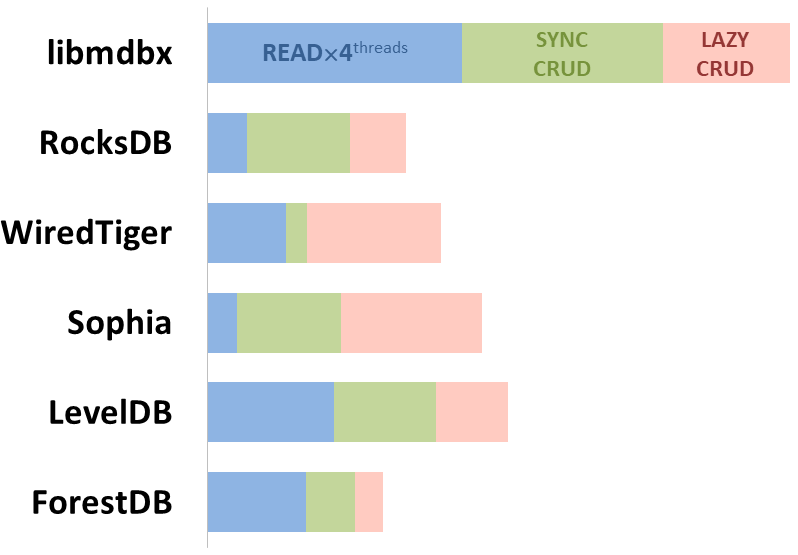
|
|
|
|
--------------------------------------------------------------------------------
|
|
|
|
## Read Scalability
|
|
|
|
Summary performance with concurrent read/search queries in 1-2-4-8
|
|
threads on 4 CPU cores machine.
|
|
|
|
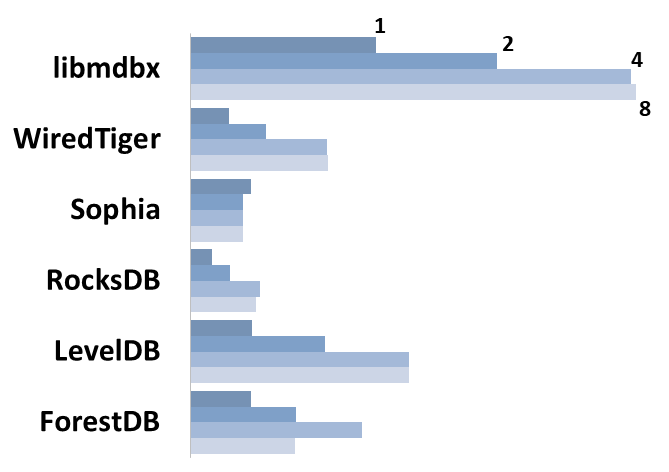
|
|
|
|
--------------------------------------------------------------------------------
|
|
|
|
## Sync-write mode
|
|
|
|
- Linear scale on left and dark rectangles mean arithmetic mean
|
|
transactions per second;
|
|
|
|
- Logarithmic scale on right is in seconds and yellow intervals mean
|
|
execution time of transactions. Each interval shows minimal and maximum
|
|
execution time, cross marks standard deviation.
|
|
|
|
**10,000 transactions in sync-write mode**. In case of a crash all data
|
|
is consistent and state is right after last successful transaction.
|
|
[fdatasync](https://linux.die.net/man/2/fdatasync) syscall is used after
|
|
each write transaction in this mode.
|
|
|
|
In the benchmark each transaction contains combined CRUD operations (2
|
|
inserts, 1 read, 1 update, 1 delete). Benchmark starts on empty database
|
|
and after full run the database contains 10,000 small key-value records.
|
|
|
|
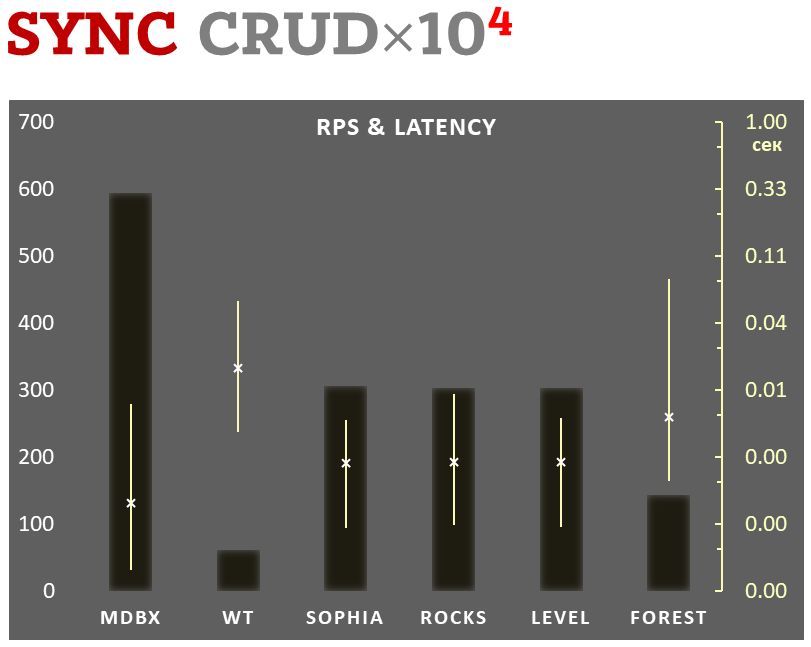
|
|
|
|
--------------------------------------------------------------------------------
|
|
|
|
## Lazy-write mode
|
|
|
|
- Linear scale on left and dark rectangles mean arithmetic mean of
|
|
thousands transactions per second;
|
|
|
|
- Logarithmic scale on right in seconds and yellow intervals mean
|
|
execution time of transactions. Each interval shows minimal and maximum
|
|
execution time, cross marks standard deviation.
|
|
|
|
**100,000 transactions in lazy-write mode**. In case of a crash all data
|
|
is consistent and state is right after one of last transactions, but
|
|
transactions after it will be lost. Other DB engines use
|
|
[WAL](https://en.wikipedia.org/wiki/Write-ahead_logging) or transaction
|
|
journal for that, which in turn depends on order of operations in
|
|
journaled filesystem. _libmdbx_ doesn't use WAL and hands I/O operations
|
|
to filesystem and OS kernel (mmap).
|
|
|
|
In the benchmark each transaction contains combined CRUD operations (2
|
|
inserts, 1 read, 1 update, 1 delete). Benchmark starts on empty database
|
|
and after full run the database contains 100,000 small key-value
|
|
records.
|
|
|
|
|
|
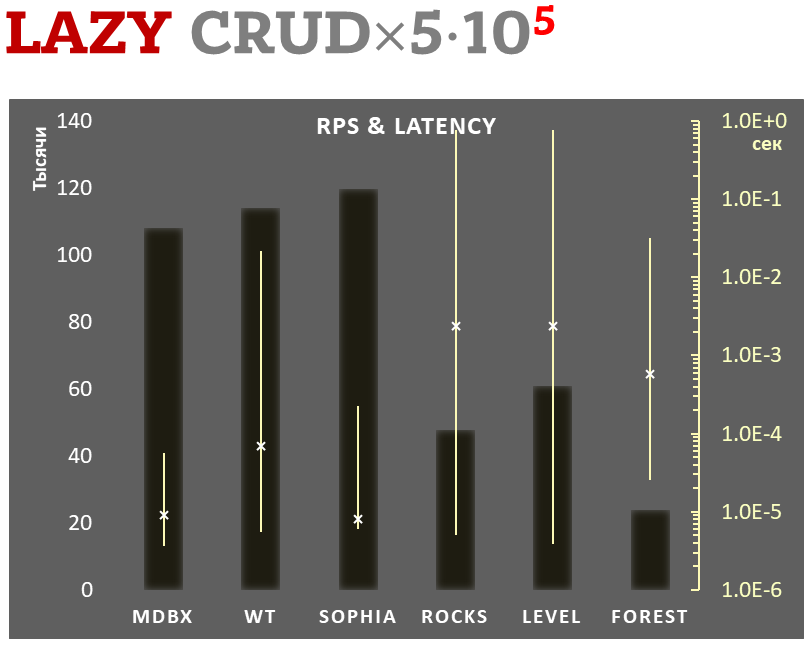
|
|
|
|
--------------------------------------------------------------------------------
|
|
|
|
## Async-write mode
|
|
|
|
- Linear scale on left and dark rectangles mean arithmetic mean of
|
|
thousands transactions per second;
|
|
|
|
- Logarithmic scale on right in seconds and yellow intervals mean
|
|
execution time of transactions. Each interval shows minimal and maximum
|
|
execution time, cross marks standard deviation.
|
|
|
|
**1,000,000 transactions in async-write mode**. In case of a crash all
|
|
data will be consistent and state will be right after one of last
|
|
transactions, but lost transaction count is much higher than in
|
|
lazy-write mode. All DB engines in this mode do as little writes as
|
|
possible on persistent storage. _libmdbx_ uses
|
|
[msync(MS_ASYNC)](https://linux.die.net/man/2/msync) in this mode.
|
|
|
|
In the benchmark each transaction contains combined CRUD operations (2
|
|
inserts, 1 read, 1 update, 1 delete). Benchmark starts on empty database
|
|
and after full run the database contains 10,000 small key-value records.
|
|
|
|
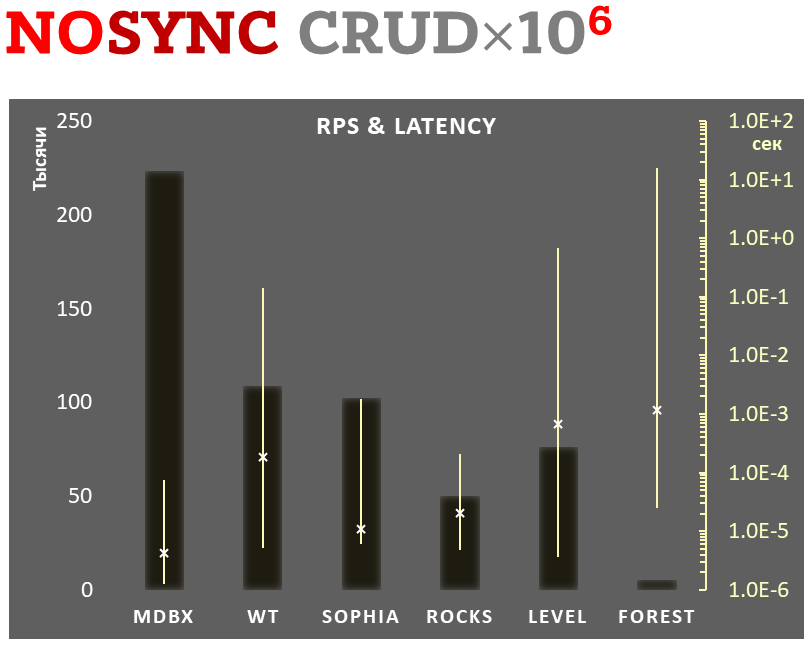
|
|
|
|
--------------------------------------------------------------------------------
|
|
|
|
## Cost comparison
|
|
|
|
Summary of used resources during lazy-write mode benchmarks:
|
|
|
|
- Read and write IOPS;
|
|
|
|
- Sum of user CPU time and sys CPU time;
|
|
|
|
- Used space on persistent storage after the test and closed DB, but not
|
|
waiting for the end of all internal housekeeping operations (LSM
|
|
compactification, etc).
|
|
|
|
_ForestDB_ is excluded because benchmark showed it's resource
|
|
consumption for each resource (CPU, IOPS) much higher than other engines
|
|
which prevents to meaningfully compare it with them.
|
|
|
|
All benchmark data is gathered by
|
|
[getrusage()](http://man7.org/linux/man-pages/man2/getrusage.2.html)
|
|
syscall and by scanning data directory.
|
|
|
|
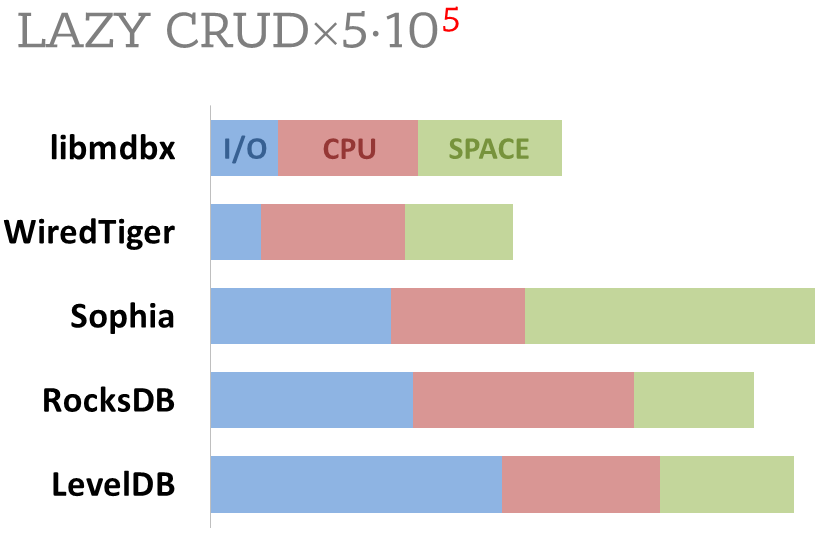
|
|
|
|
--------------------------------------------------------------------------------
|
|
|
|
```
|
|
$ objdump -f -h -j .text libmdbx.so
|
|
|
|
libmdbx.so: file format elf64-x86-64
|
|
architecture: i386:x86-64, flags 0x00000150:
|
|
HAS_SYMS, DYNAMIC, D_PAGED
|
|
start address 0x0000000000003710
|
|
|
|
Sections:
|
|
Idx Name Size VMA LMA File off Algn
|
|
11 .text 00015eff 0000000000003710 0000000000003710 00003710 2**4
|
|
CONTENTS, ALLOC, LOAD, READONLY, CODE
|
|
```
|